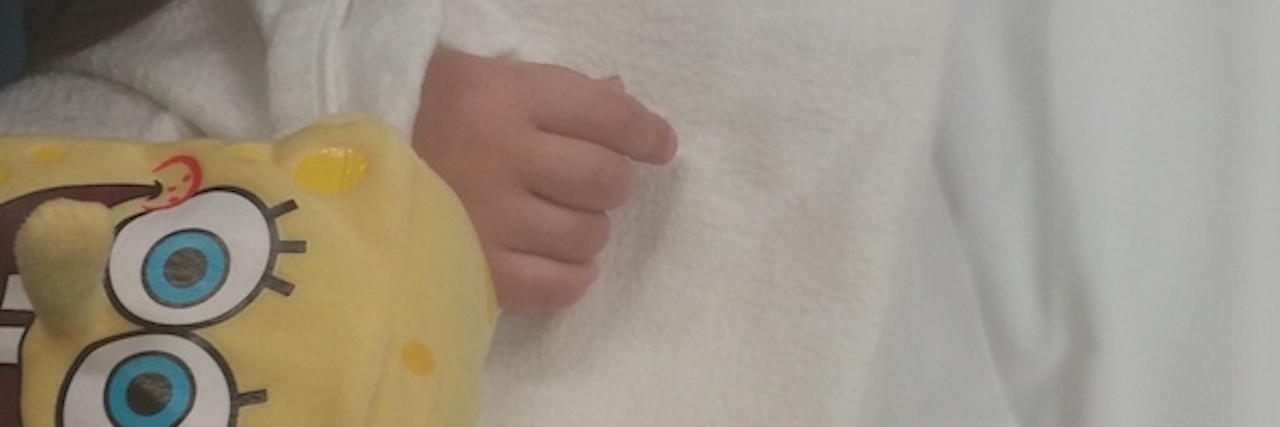When My Medically Fragile Son Impressed a Nurse by Asking for a Pillow
My son — B-man or Bucky, depending on his mood — had just awoken from a six-hour surgery. The surgeon came out and gave us an adrenaline-fueled recap. I will never tire of hearing this part: “He’s going to be fine. Everything is going to be OK.” That pervasive melty feeling in my legs started to fade.
The doctor told us only one person could go in, so I pushed my husband out of the way. Me. I’ll do it! I had not seen my son since the night before and I was pretty darn excited to say “Hi, what’s up dude? Congratulations on your fifth successful surgery!” I followed the volunteer down the hall.
In the past, Bucky always looked a bit angry when reentering the world after a general anesthetic. This time he was a seasoned veteran: already conscious and breathing on his own. He started ordering the nurses around.
“Two pillows!”
This phrase, B-man’s description of his favorite sleeping position, involves two pillows on his lap with his upper body flopped over the top. It’s exactly how I imagine a mini-Batman to sleep, if he tired from the upside-down position. Since he wears a BiPAP mask while sleeping, he can safely be smushed into his pillows and breathe.
His assigned nurse squealed first, “Oh my gosh, that’s so cute!”
The other nurses in the recovery area joined in.
“So cute!”
“Look at him!”
“Oh my goodness, did you hear him?”
“He is just so smart!”
Oh dear.
The nurses called him “smart” for requesting a pillow (two!) and seemed surprised he could actually speak. I assume his smaller size leads people to believe that he’s much younger than his current age of 4 and a half. However, the critical thinking part of my brain was screaming.
My son’s physical condition, namely differences in his lungs and bones, has no influence on his cognitive abilities. The seeming assumption that he can’t communicate needs, either orally, using sign language or through assistive technology, is a false one.
Fast-forward to four days later. My son and I are sitting on his bed playing on an iPad. Already in our final stretch of this hospital visit, we wait anxiously for the discharge papers. We start to shove toys in millions of reusable grocery bags and pack up the car. There was one more thing on our “to-do” list: the monthly respiratory syncytial virus (RSV) injection.
The nurse informed us the shot was going to be ready “any minute now.” When it comes to administering shots, we find that a few things work well: 1) Honesty. We tell Bucky exactly what’s about to happen, no longer than 30 seconds before the shot. 2) The faster the better. No slow pokes allowed. And 3) Hide the needle for as long as possible. We are not contestants on “The Price is Right.” We do not need a good look at the product.
This nurse slowly (I mean slowly) sauntered in holding the needle up towards the ceiling. I slow-motion yelled a “No!” from across the room.
“Alright, we’re ready!” When it comes to needles, my son seems to be able to smell them from three rooms away. Bucky screamed. The nurse fumbles, breaking rule #2, while giving us zero opportunity to have the “needle talk” with him.
This procedure usually takes about 15 seconds. This time, it took a good three minutes. I believe the entire ordeal could have been avoided had the nurse treated him like someone who was aware of exactly what was going to happen. My son’s extensive hospital stays mean he has a heightened awareness of what’s going on around him. He knows all about X-rays, blood tests and echocardiograms. I believe he could draw you a detailed picture of them happening all at once to Superman, if he put his mind to it.
I’m tired of having to remind nurses and doctors and lab technicians to use discretion when speaking in front of us because my son understands everything we talk about. My son is intelligent, observant, communicative. Our frequent interactions with health care providers have demonstrated, multiple times, that their default assumptions often reflect none of these things. I would love for those who work with patients like my son to have a more open attitude towards ability.
My hope is that one day I’m not met with a look of shock when he suddenly starts a conversation, or gets out of his wheelchair to take a few steps, or asks a nurse for a pillow.
My husband and I are his biggest cheerleaders. We applaud every step, every bite, and every new level he clears in Super Mario Bros. U. I’m not saying that strangers shouldn’t be applauding him, too.
I’d prefer the applause to be for something other than asking for a pillow.
Follow this journey on Mother of Bones.
The Mighty is asking the following: Describe a moment when you were at a hospital and a medical staffer, fellow patient or a stranger made a negative or surprising comment that caught you off guard. How did you respond to it? If you’d like to participate, please send a blog post to community@themighty.com. Please include a photo for the piece, a photo of yourself and 1-2 sentence bio. Check out our Submit a Story page for more about our submission guidelines.

